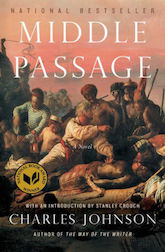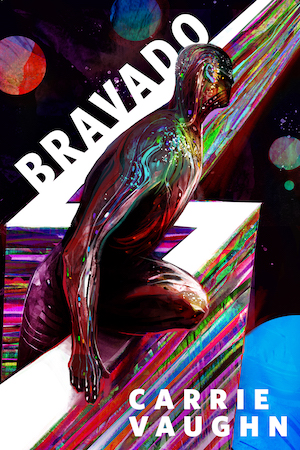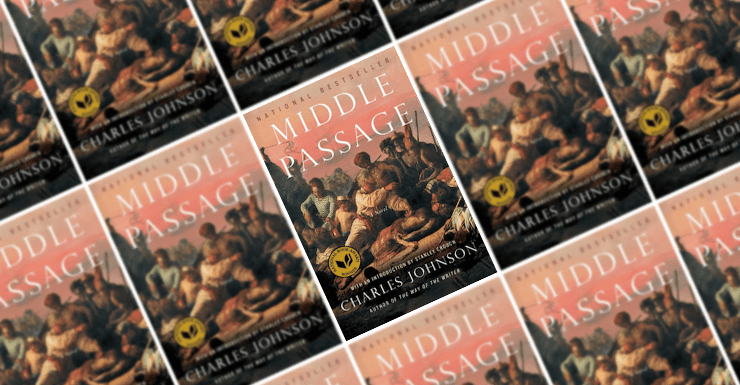In 2016, Fantastic Stories of the Imagination published my survey “A Crash Course in the History of Black Science Fiction” (now hosted here). Since then Tor.com has published 22 in-depth essays I wrote about some of the 42 works mentioned, and another essay by LaShawn Wanak on my collection Filter House. This month’s column is dedicated to Middle Passage by Charles Johnson.
A NONSLAVE NONNARRATIVE
Set in the 1830s, Middle Passage tells how Rutherford Calhoun sailed on a slaver from the mouth of the Mississippi River to a West African slave market, and halfway back again. Before the book begins, Calhoun’s former enslaver has released him, and our hero has thieved and gambled his way into an untenable position with a powerful New Orleans loan shark. Stowing away on the barely-seaworthy Republic to escape threats to his health and freedom, he finds himself the sole black man aboard. Calhoun must pay off the cost of his passage by working as the tobacco-spitting cook’s assistant—a salary-less set-up far too reminiscent of his boyhood captivity.
Buy the Book


Middle Passage
Grumbling in longwinded unofficial log posts as they cross the Atlantic, Calhoun describes a vessel on its last sea legs, “perpetually flying apart and re-forming…the great sails ripping to rags in high winds, the rot, cracks, and parasites…cancerously swift…” Constant carpentry and defensive drunkenness are de rigueur.
However, once Africa’s reached, the horrific plight of the enslaved men, women, and children loaded onto the ship there finally overcomes the stowaway’s denial mechanisms and pierces his self-centeredness. Though no one forced Calhoun to hide in the flat bottom of Republic’s launch, both he and the “Allmuseri” (author Johnson’s imagined ethnicity) stuffed into the ship’s sewage-sloppy hold are now compelled by whites to act against their interests. He comes to empathize with the poor captives, even adopting one of them as his daughter.
There’s another attitude Calhoun and the Allmuseri share: a sort of Buddhist detachment from the world’s joy and suffering. Far from craving revenge, the manacled captives dread the ill fortune they believe will inevitably result from the harm they inflict on the crew with their uprising. Calhoun’s hesitancy—for example, when he neither agrees to spy on the seamen and captives for Republic’s captain, nor outright refuses the chore—seems at first to stem from diffidence. Gradually, though, and especially after a hallucinatory confrontation with the Allmuseri’s god, which has been crated up and stowed with a bunch of other pieces of colonial plunder, his motivation becomes more reflective of confidence than its lack. Gazing out over a gathering storm at “tumbling, opaline blades of ocean,” he muses that its vortices are mirrored in his own soul. He is one with the universe.
According to the backstory Johnson gives him, Calhoun was taught young to purple his prose. Much of his peculiar narrative consists of hyperbolic phrases such as “a billion billion rebirths” and “a drifting laboratory of blood-chilling diseases.” From the sea and the imprisoned god and Allmuseri syntax he learns to challenge time’s linearity. Unreliable, elliptical, and elaborate, Calhoun’s storytelling reflects his eccentric schooling, his acquired wisdom, and the cosmic lessons in intersubjectivity forced on him during Republic’s last two voyages.
IN REVERSE
Like many modern descendants of the notorious Atlantic slave trade’s survivors, Calhoun retraces the route his ancestors traveled, going backwards. He begins in Illinois and makes his way downriver—deeper and deeper into the South, the land which gripped his captive forebears most unrelentingly. From the U.S.’s southernmost port he then sails to Africa. But rather than the headwaters of Sandra Jackson-Opoku’s The River Where Blood Was Born, Calhoun uncovers deals and corruption, and uses his new-won tenderness to wrestle things into a semblance of fairness. He finds not roots but fruits, not causes but consequences, and accepts and shapes them.
FROM THIS MOMENT ON
It’s this willful revising of the past’s legacies that makes Middle Passage so thoroughly science-fictional. Though the novel is set in the early Victorian era, Johnson avoids imbuing his characters with stereotypical traits of that period. Questioning the status quo via how he writes as much as what he writes, Calhoun represents the unrepresentable, the unusual, the uniquely authentic experience of blerdliness (aka black nerdliness), that essence of Afro-diasporan cool. By the book’s end Calhoun realizes he can form his own conclusions based on what’s really happening. He pays attention to actual events. He abandons prepared scripts. Speculation thrives on open-eyed observation, and Middle Passage teaches both characters and readers how to clear their minds of all impediments and consider all a life story’s possibilities. It’s a kind of primary course for dreamers, one in which the customary syllabus of historical outrages gives way to an experimental one featuring meditation and the audacity of hope.
OUR BEAUTIFUL REWARD
In 1990, Middle Passage won the National Book Foundation’s prestigious National Book Award. At the presentation ceremony, Johnson predicted that the focus of Black-authored fiction would shift in the coming decade “from narrow complaint to broad celebration.” This has certainly been the case as far as the imaginative genres.
In 2014, SF author Ursula K. Le Guin received the National Book Foundation’s Medal for Distinguished Contribution to American Letters. She used the occasion to warn of the negativity rising from the commodification of books. However, her historic speech also praises the group effort that won what she repeatedly calls a “beautiful reward.”
The medal which white ally Le Guin was given only symbolizes our reward and doesn’t begin to encompass the glory of our entire haul, which includes Middle Passage and its many literary siblings and offspring. These are best savored unmediated, fresh and direct. Enjoy them; there are more where they came from—my list of 42 works and the various supplementary texts we can dig up and dig into together.
 Nisi Shawl is a writer of science fiction and fantasy short stories and a journalist. She is the author of Everfair (Tor Books) and co-author (with Cynthia Ward) of Writing the Other: Bridging Cultural Differences for Successful Fiction. Her short stories have appeared in Asimov’s SF Magazine, Strange Horizons, and numerous other magazines and anthologies.
Nisi Shawl is a writer of science fiction and fantasy short stories and a journalist. She is the author of Everfair (Tor Books) and co-author (with Cynthia Ward) of Writing the Other: Bridging Cultural Differences for Successful Fiction. Her short stories have appeared in Asimov’s SF Magazine, Strange Horizons, and numerous other magazines and anthologies.










